The JAM² platform is a full suspension, trail style, electric mountain bike built around the same geometry as the non-electric Focus JAM. The idea here, is that Focus is “focusing” on building a well-balanced, high-quality bicycle… that can be utilized in two different ways, with or without pedal assist. Of course, the electric version will cost more because of the motor, battery pack, and I’m guessing lower production volume. The Pro version covered here retails for $5,999 but you can opt for the lower-specced LTD model which is closer to $5k and in my opinion, that is not bad at all, considering they both utilize the brand new Shimano E8000 mid-motor and a custom-made downtube integrated battery pack from Focus. Note how clean the frame looks with internally routed cables, the hidden battery, and that compact centerdrive motor. In my opinion, Focus made a smart move going with black as the base color because it matches and hides the motor casing and cable housing, but the grey and blue accents are carried through the fork and rims so it retails a sporty fun feel. The bike comes in four frame sizes, so you can really dial in fit, and is offered with plus sized 27.5″ wheels or taller 29″ that will raise the bike, lower the attack angle, and offer more of a cross country feel. Both suspension components are highly adjustable, with compression and rebound clickers, and use air vs. springs. To me, the best parts of this electric bike in order of importance are the way it looks, how lightweight it is (just 46 lbs thanks to the lower capacity primary battery), and how reputable both Focus and Shimano are (selling through top dealers only and offering a two-year comprehensive warranty). A few nice-to-have features are the dropper seat post (which makes mounting easier and is important for trail and light all mountain riding), large 203/180 mm hydraulic disc brakes with adjustable reach levers, the optional Shimano Di2 electronic shifting that works with the main display panel (this option comes with the Pro model only), an 11 speed drivetrain with traditional chainring and no reduction gearbox (easier to swap to different sizes, less pedaling drag), and the nifty click-on bottle cage adapter (which also works with mini-pumps and folding locks). In so many ways, this looks like the future of electric assist bikes. It’s beautiful, modular, focused on fit and performance, and it’s extremely capable. Note that I was testing, measuring, and weighing the 44 cm Medium sized frame for this review.
Driving this e-bike is a Shimano E8000 mid-drive motor that was specifically designed for mountain riding. It offers up to 70 Newton meters of peak torque and some of the highest RPM support I have ever experienced. Where Bosch, Brose, and some other brands are able to deliver up to 120 RPM (allowing you to spin faster and still get power, not having to shift as frequently to hit high speeds), the Shimano E8000 was still helping at 140 RPM… Maybe not very much, but it was definitely on par with or slightly ahead of the Bosch CX motor and a step beyond the new Yamaha PW-X in my opinion. It’s not the quietest or loudest motor, the noise being produced really depends on your RPM as shown in the video review during my pedal tests. The motor controller measures rear wheel speed, pedal cadence, and pedal torque to offer a dynamic and satisfying experience, but it wasn’t as smooth to start as Brose or Bosch. I definitely noticed, and actually felt, when the motor kicked in. There seems to be a torque threshold where pedaling without much effort (say, if you were coasting and just gently pedaling) won’t activate it right away. Once your pedal torque is increased, it feels like there is a click or a catch and then the motor feels fluid from there on out. Having tested both the European specced 25 km/h models (that’s 15.5 mph top speed) and then the US version specced at 32 km/h (up to 20 mph), I definitely preferred the US and found that I enjoyed riding in Eco and Trail mode… whereas, I was constantly in the highest Boost mode on the European models. Take this feedback with a grain of salt however, because I was riding all European models with some software updates for the “US” spec, and perhaps there was even some tinkering with the Shimano E-TUBE app to adjust Trail and Boost settings before we rode. I can say, I tested two versions of the JAM² as well as the hardtail BOLD² model. What you get with this motor system is a compact design, possibly the prettiest I have seen, high RPM support, no shift detection (so ease off when shifting to reduce mashing and chain wear), and a standard 175 mm Q Factore (the distance between the crank arms).
Powering the JAM² is a custom, internally mounted tube battery that Focus designed and manufactures. Many of the other Shimano motor partners are using a downtube mounted pack that resembles a black box (similar to the Bosch Powerpack) offering 36 volts and 11.6 amp hours… You can see a picture of this pack with the older Shimano STePs E6000 motor on the Trek Neko+ here. So, you can really see how it cleans up the look and lowers the weight by going with the tube battery. The downside is that this pack only offers 36 volts and 10.5 amp hours of capacity, it’s not going to take you as far… but it weighs less. And this is where the really interesting stuff comes out. You can double the range of the Focus JAM² by purchasing an additional battery pack called the TEC Pack (Tailored Energy Concept) which connects on top of the downtube and uses a magnetic EnergyBus Rosenberger plug to sync with the bike. The 378 watt hour TEC Pack weighs 0.2 lbs more than the integrated downtube pack and costs $699. Once connected, it completely switches the bike’s power source, so the bike is not trying to balance both. This could be a welcomed feature if you plan to bring several TEC Packs along on a bikepacking trip and want to keep the integrated tube battery as a reserve… however, my understanding is that Lithium-ion batteries will last longer if you keep them between 20% and 80% vs. fully charging and discharging all the time. The way the modular battery design on the Focus bikes is setup, it’s like you would drain the TEC Pack or main battery and then switch to another pack for a more series type approach vs. parallel. It’s a minor consideration, but becomes increasingly relevant when you notice that Bosch has gone with a parallel design for discharging and charging. It’s more obvious that at least charging is a win with parallel connections because you can plug the bike in once and see both batteries filled vs. charging them one at a time. In addition to powering the motor, the battery system on the Focus Squared models also powers the color, backlit display panel, and electronic shifting (if you get Di2 Pro model) as well as lights if you work with a shop to have them installed. It’s so cool to see a Shimano drivetrain, motor system, battery, display, and app… but I do feel that theres some opportunity here for the shifting system to tell the motor what is going on so you can opt for some sort of drivetrain protection. Some of the older Focus models running on the in-house Impulse drive system offered great shift protection. You didn’t have to worry about the motor grinding your gears if you weren’t adept at shifting… but given the high-performance use case of this mountain model, maybe it’s not a big deal because riders should have more experience shifting and climbing simultaneously?
Operating the bike is fairly straightforward, but physically separated at times. What I mean is, after you have charged the battery or batteries, and are ready to turn the bike on, you have to hold this power button on the top tube for a couple of seconds until it slowly lights up. At this point, the Shimano Di2 display panel blinks on in color, and shows your battery level with five bars, current speed, and assist level. It’s clean, stays out of the way, but is not removable, does not have a Micro-USB charging port for accessories, and is very far to reach if you want to switch views. There’s a little rubber circular button on the base of the display that lets you cycle through trip distance, average speed, timer and some other readouts… but there’s no way to reach this while riding unless you completely remove your right hand and reach over very carefully to press the little circle. It’s a far cry from most of the other major display and control pad designs which are easy to reach. Usually, you can adjust assist and menus by reaching over from the left and pressing an i or mode button. Even this can be sketchy if you’re on rough mountainous terrain, which is exactly what the JAM² is built for. So, I probably would never use these sub readouts unless I was fully stopped. The good news is, you can easily change assist levels by pressing the trigger shifter buttons on the left. Navigating from no-assist to Eco, Trail, and Boost is satisfying because you feel and hear this click, like shifting gears on a traditional bicycle. It’s just an illusion, a skeumorph, no cables are being pulled, just electronic signals being sent to the display panel control system. For those who wish to adjust shifting speed on their Di2 derailleur, set the clock, adjust brightness, turn off the beeping noise or explore other options, just hold the rubber circle button on the display for several seconds to get into the settings menu and then navigate up and down with the left shifter buttons. You can get even more options by downloading the Shimano E-TUBE app for your smartphone and syncing it, and you can also connect ANT+ devices to track biometric data. All things considered, the cockpit on this electric bicycle is one of the cleanest and simplest I have tested but it’s not the most convenient. The display isn’t always easy to read because of its small size, dark smoked plastic lens, and fixed position (think glare) but the tactile click of the shifter buttons works great once you know the bike is turned on. And again, the fact that you have two buttons near the left grip, one tiny button near the center, and the big power button on the top tube just seems spread out and unnecessary to me. For an e-bike that looks so stealthy in some ways, why do they think I need a big circle like I have on my old computer tower? Even my new laptop just has a power button on the keyboard, blending in and within reach like all of the other buttons. Yes, I have a MacBook Pro laptop for those wondering.
Focus is building the future with their squared series and I think the JAM² would be an excellent option for people looking to ride below the radar on trail or cross country terrain. The lightweight low-resistance design is ideal for active riders who enjoy pedaling and might want a short range setup that is fun to pedal even when off. The 140 mm air suspension offers plenty of adjustment with compression and rebound clickers, plus sized tires pair nicely with the longer boost axles and a 15 mm front 12 mm rear thru-axle setup for stiffness and strength. The back wheel does not have quick release, which surprised me, but the front does. You get all of the design features you might expect from a “real” mountain bike such as tapered head tube, shorter stem, locking Ergon mountain grips, and an upgraded wheelset. It even comes with some decent plastic platform pedals from Concept (the Focus in-house brand). Also note, the narrow-wide tooth pattern on the chainring and full-surround chain keeper that will eliminate drops. I cannot say for sure because I was unable to test this in muddy terrain, but I’m guessing the traditional chainring will also eliminate problems with chain suck that some riders have had with the smaller Bosch chainring in the UK. I don’t think this happens to a lot of people, but I know at least one that rides long distance races who has mentioned it. Anyway, big thanks to Focus for partnering with me on this review and helping to answer as many questions as they could at Interbike. And to Chris Nolte from Propel Bikes who was on hand at Interbike to help me with a deep-dive. He has attended Eurobike and other international events and had a deeper perspective on this bike, so it was nice to get feedback. I also tried to get as many questions answered by Shimano as I could, but feel free to share your own thoughts and questions in the comments below and forums as well.
Pros:
- The Shimano STePs E8000 motor is compact, tightly integrated into the bottom bracket area of the frame, it blends into the black colors, it’s also narrower than many other ebike centerdrives right now with a 175 mm Q Factor so your leg and feet position feel more like a traditional bike, the spindle is positioned further back so it supports a shorter chainstay length for snappy ride feel, and it spins well above 120 RPM which is slightly better than the other leading motors such as the Bosch Performance Line, Brose, and Yamaha PW-X which assist up to 120 and then back off
- The battery is completely hidden and protected inside the downtube, it might go undetected for those who prefer a stealth looking electric mountain bike, Focus and Shimano have a close relationship and this battery design is unique to these bikes (the JAM² and BOLD²)
- Weighing in at ~46 lbs, this is one of the lightest full suspension electric mountain bikes being sold right now in the US, especially with such a capable motor and battery pack, the optional TEC Pack doubles range and only adds ~4.7 lbs
- Focus is refining their product lineup in such a way that you can opt for electric or non-electric but get the same geometry, look, and ride feel… The JAM² and JAM provide this option
- The charger puts out 4 Amps, making it about twice as fast as most standard chargers, and it’s compact and lightweight at ~2 lbs, the plug connector is magnetic and will pop off vs. bending or tipping the bike if tripped over
- You shouldn’t have a problem with chain drops on this e-bike because the front sprocket uses narrow-wide teeth to improve grab and reduce slip, there’s also a plastic full-surround chain keeper where in place of a front derailleur
- I like that Focus is using a traditional sized chainring because it makes switching sizes easier than the proprietary rings offered by Bosch and TTIUM, there is also very little resistance when pedaling because there’s no reduction gear gearbox to match a stepped-down chainring
- For those who opt to pay more for the Pro model with Shimano Di2 electronic shifting, it’s neat that the Shimano display is used for both assist level and shifting and is powered off of the main battery pack vs. an independent cell like some other e-bikes I have see (specifically, the Stromer ST2 S)
- I reviewed the Plus model here which uses 27.5″ x 2.8″ Maxxis Rekon+ tires that offer improved traction, comfort on rough terrain, and rolling momentum for a nice all-mountain feel, Focus used Boost length axles with 15 mm and 12 mm thru-axles for stiffness, to accommodate the wider tires, and strengthen the spoke angle, they also offer the bike with 29er tires that are a bit narrower and more for cross country or light trail riding
- Great aesthetics, blue and grey accents cover the frame, fork, and wheelset, I appreciate the thick rubber slap guard on the right chainstay to reduce nicks and scratches
- There are air channels built into the upper section of the downtube that are designed to promote cooling of the battery pack and motor, it’s like a sport car with a hood scoop! I was told that water and dust can get in here without wrecking any of the electronics, they let out near the motor
- The display offers a good range of power adjustment (three assist levels) and readouts on its own, but you can use the smartphone E-TUBE app from Shimano to further refine and adjust the two higher assist levels or your Di2 shifting setup, or pair the bike with an ANT+ heart rate monitor for biometric feedback
- Powerful, high-quality hydraulic disc brakes from Shimano, the two-finger levers offer adjustable reach (tool free on the Pro model) to fit different hand sizes and since this e-bike comes in four frame sizes, it’s great that you can really set things up to fit right
- It’s really neat that the downtube railing system can be used for a bottle cage adapter if you aren’t using the TEC Pack battery, so many electric bikes are not able to fit bottle cage bosses or they just skip them… so it’s cool that the JAM² solved this in a way, note also that the downtube mount is adjustable and could work with a folding lock, mini pump, or other accessory using the same plastic plate
- I’m a big fan of seat post droppers, they make it easier to mount the bike and more comfortable to transition from bumpy or downhill sections and jumps to cross country or road… so it’s nice that you get one with this electric bike
- Focus developed a new rear suspension design that is used on the JAM series called Fold, it allows for 30% travel on smaller bumps and and reserves 70% for larger hits, it should reduce bobbing and compete well against standards like Horst Link four bar
- The Shimano E8000 is a relatively new motor design to hit the US market and it was designed with short chain stay, high clearance, and narrower Q Factor from the start, so they don’t have to tip the motor up and forward like Bosch and can achieve a snappy fun feel more easily
- The Shimano X2 Di2 derailleur comes with a Shadow Plus one-way clutch (the little grey lever on the side) that can reduce drops and chain slap when clicked into the up position, it’s a mountain-specific feature but more and more electric bikes are using it since they tend to ride faster and on more varied terrain
- I’m not sure on exact pricing, but it seemed like the LTD (base model) JAM² model was only a couple hundred dollars more than the hardtail BOLD² (in the $5k range) which is awesome, I prefer full suspension on e-bikes because of sensitive back and neck, it’s nice to not see a huge price increase for this even though the frame is more complex
- The motor was designed to create very little pedal resistance and I found that I could pretty easily pass the top assisted 20 mph speed without feeling drag as I would on some other gear reduction mid-drives
- More brands are opting to use color LCD displays and trying to make peripheral communication possibly by associating a color with each assist level so you don’t have to look down, you can see that here with white for off, blue for eco, green for trail, and yellow for boost
- Minor detail here but both battery packs have an integrated battery capacity readout LED system, so you can tell how full they are when off the bike, it’s particularly relevant and useful for the TEC Pack
- Weight is balanced well here, both the motor and battery are placed towards the center and low on the frame for improved handling and they are both sprung, there is very little unsprung weight on these electric bikes so the suspension can perform optimally
Cons:
- Many of the Bosch, Brose, and Yamaha display panels are now offering Micro-USB ports so you can plug in portable electronic devices and get power on the go, this would be handy and nice to have if you use your phone for GPS or maybe the E-TUBE app from Shimano, but this display did not have any sort of USB port that I saw
- The primary battery is not designed for easy removability, it can be removed for replacement but this requires taking the motor unit off and sliding the pack down through the bottom bracket area, the downside is that you’ll need to park the bike closer to a power outlet or use an extension cord to charge vs. bringing the pack inside (keep the bike and optional extra battery in cool dry locations to optimize battery life, extreme heat and cold can be hard on them)
- It felt like a bit of a missed opportunity that the motor does not offer shift detection, especially if you get the Pro model with electronic Shimano Di2 shifting, it seems like having all Shimano systems could allow them to do something special here like talking to each other to reduce mashing and drivetrain wear
- Only the front wheel offers quick release, I was a little surprised at this because trail maintenance and portability are easier with both wheels having quick release but maybe this was due to the electronic shifting? You only need a 6 mm Allen key to get the back off
- Even though the display is nice looking, compact, runs electronic shifting as well as assist level, it is not removable and might take increased wear at the bike rack or when parked outside compared to one that could easily be clicked off, also, for me the tiny round button at the bottom could be a bit difficult to press when wearing gloves and the display is a bit small and not as bright in full light
- Minor consideration here, it sounds like the bike uses one or the other battery pack, it doesn’t try to balance them like Bosch has done with their double-battery setup, and this could mean that you cycle your frame battery more frequently and wear it down a bit quicker if you aren’t occasionally clicking in the TEC Pack power cable and trying to balance them yourself manually, my understanding is that batteries like to stay between 20% and 80% for maximum charge cycles (this is partially why many smartphones have a big alert when they start to get to the 20% mark), you’re also going to have to manually connect the charger to the TEC Pack and then the bike to charge both packs vs. Bosch and some others which allow for dual-charging by connecting to just one port on the bike (you can see this with the Riese & Müller models like the Charger GX)
- If you want to adjust which menus are being shown on the display panel (odometer, trip distance, range, time, average speed, max speed, cadence RPM, clock), you have to reach way over to the tiny circular button on the bottom of the display panel and this is just inconvenient when riding… by default, the display switches back to speed or will stay on Cadence RPM if you have clicked to it, considering how easy the trigger shifter buttons are to use, this “mode” button is not so easy
- For me, the Shimano E8000 motor doesn’t go from zero to on quite as smoothly or as seamlessly as Bosch, Brose, or Yamaha, it seems like there is a cliff where you push with enough torque to get it to respond and then it sort of clicks on and you notice and even hear it, it still works great but seems to have a torque threshold or power cliff just up from zero
- I wish the display readout for battery level showed 10 bars or maybe a percentage estimation vs. the standard five bars which represent big 20% drops, but at least there is a range estimate menu for more precision
Resources:
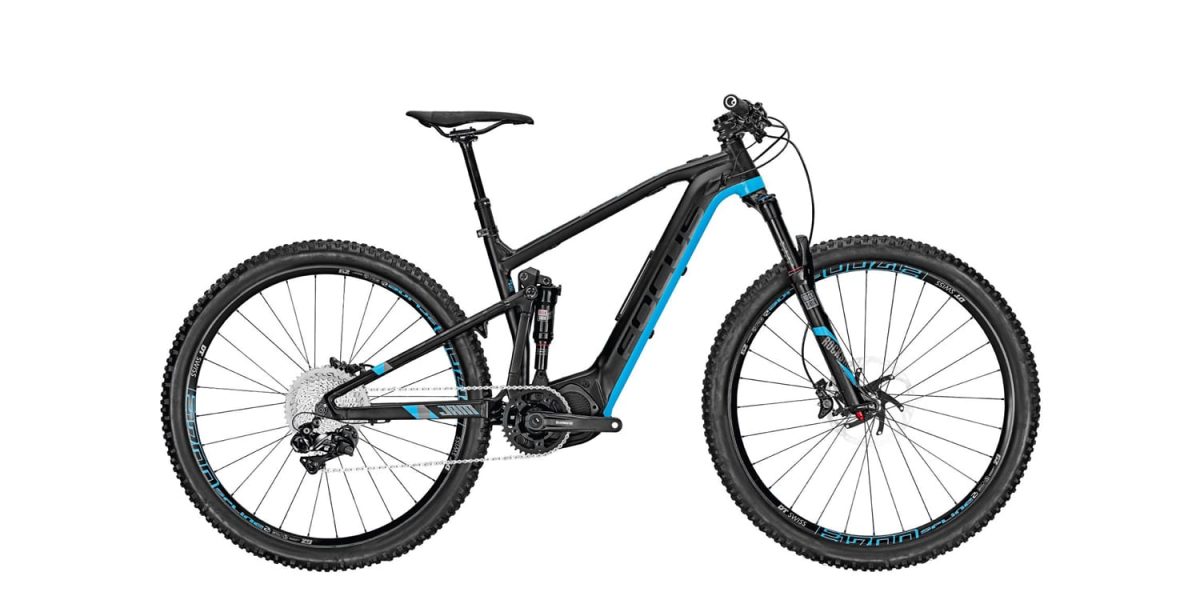














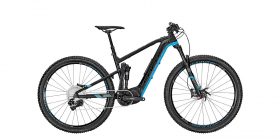
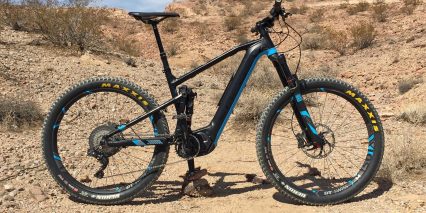
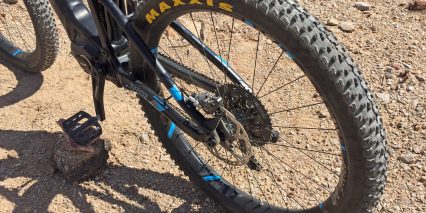
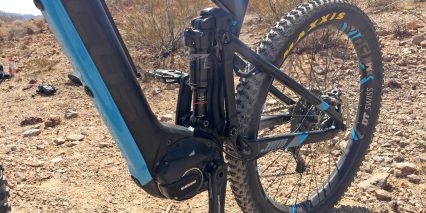
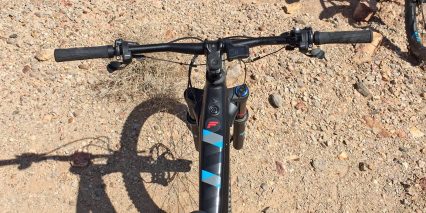
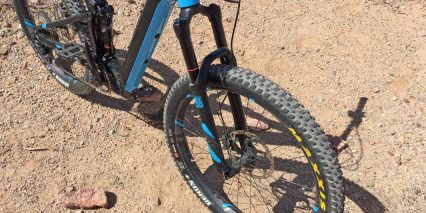
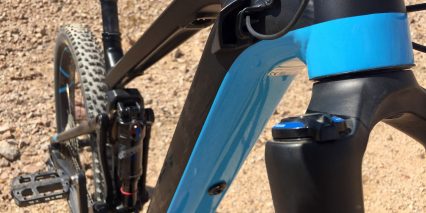
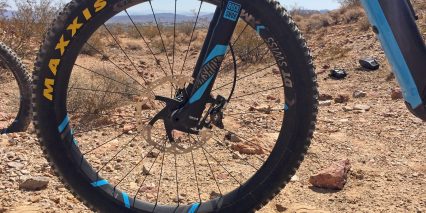
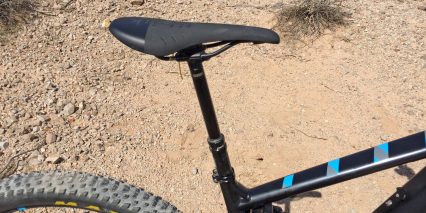
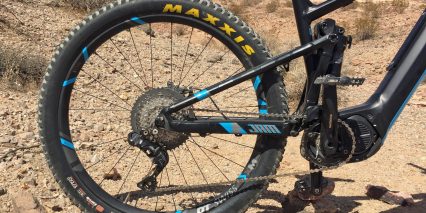
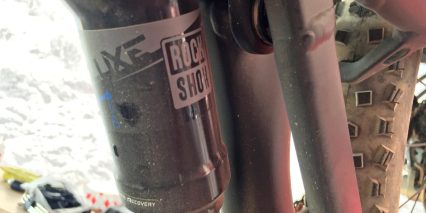
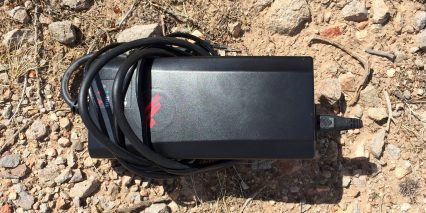
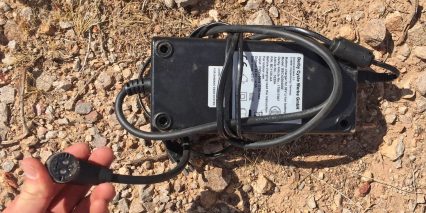
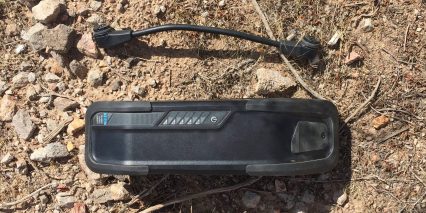
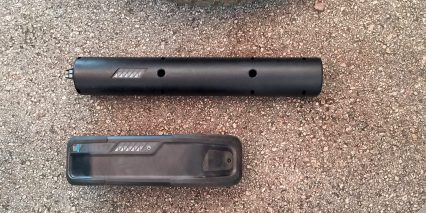

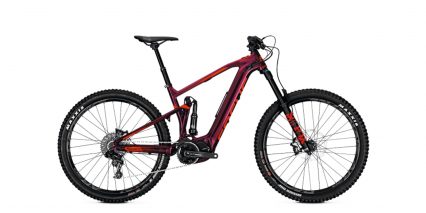
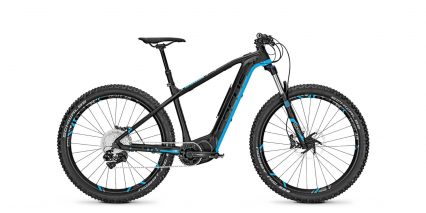
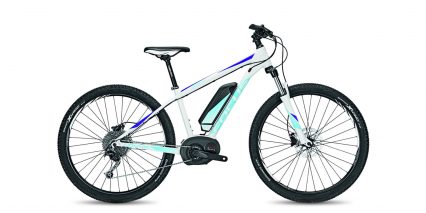
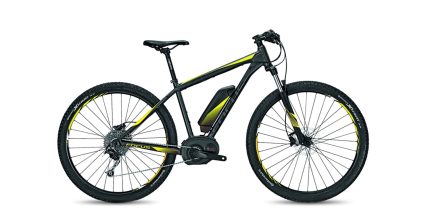
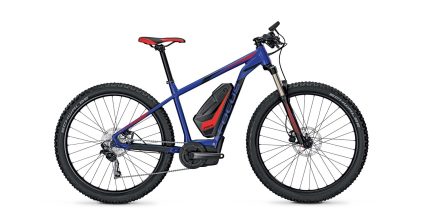
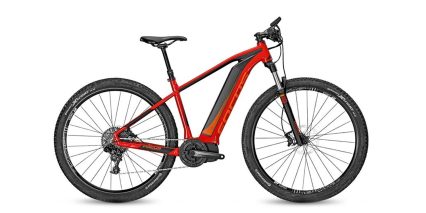
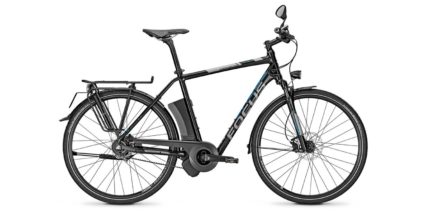
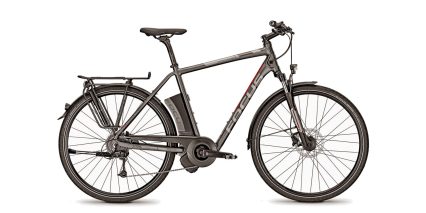
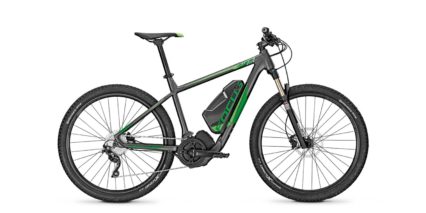
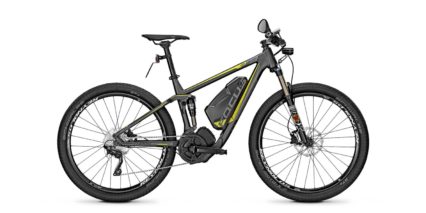
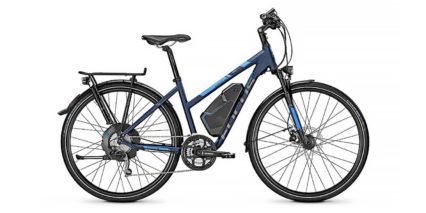
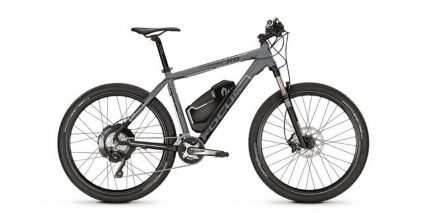
Duke
6 years agoYou make no mention of the walk assist mode in the video or the written description, yet the focus company website and also one of your other youtube videos about the Shimano Steps e8000, both mention the walk assist mode function for this bike/motor. Can you confirm if this bike has it?
ReplyCourt
6 years agoHi Duke! My guess is that it does have walk assist, but I cannot confirm. This review was conducted at a demo event and I believe the units were pre-production. Sometimes when this happens I err on the side of less detail if I’m not sure about a feature. I shot this a while back, so I can’t even remember if I tried walk assist or not. Perhaps someone in the Focus ebike forums will be able to chime in if you ask there?
Reply